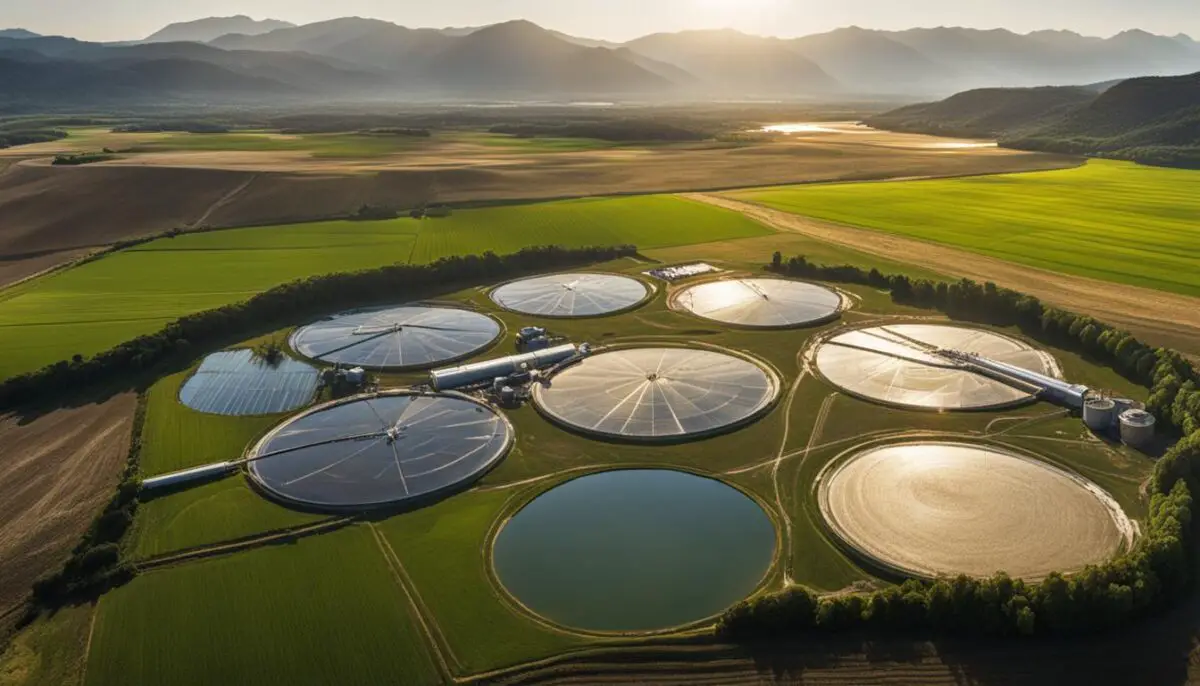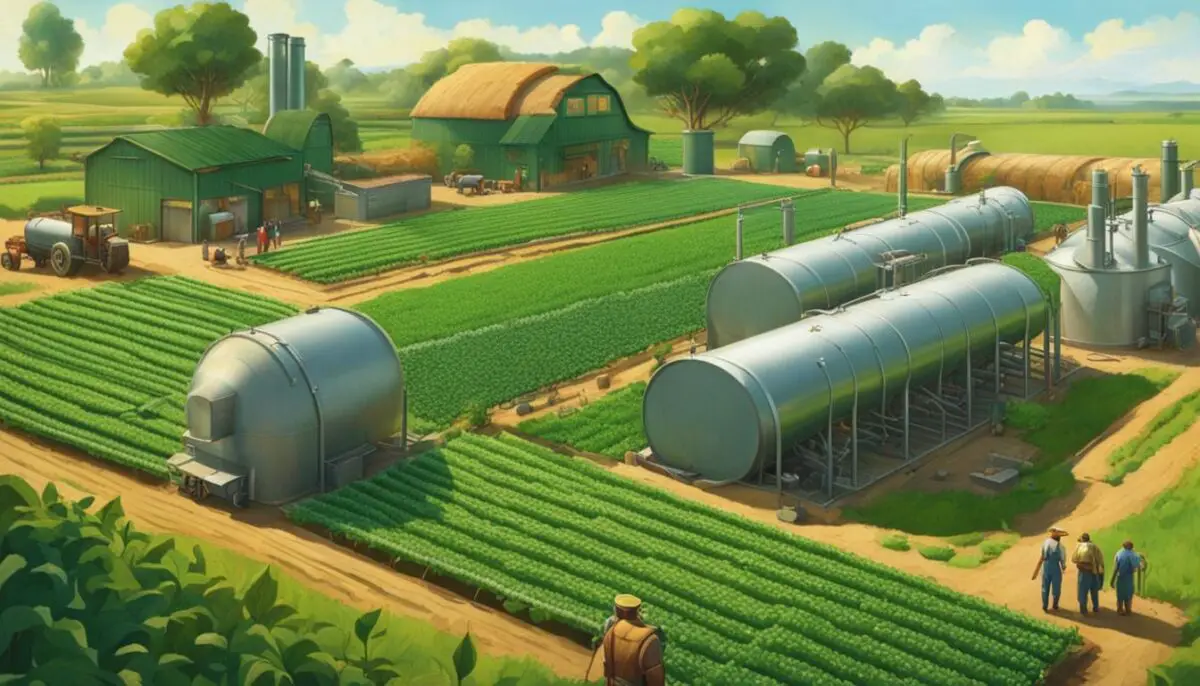Urine farming is an innovative agricultural practice that focuses on sustainable and eco-friendly methods. This article will delve into the world of urine farmers and the impact they are making on organic farming and sustainable agriculture. By utilizing urine as a natural liquid fertilizer, urine farmers are advancing ecological farming practices and promoting a more sustainable approach to agriculture.
Key Takeaways:
- Urine farming is an eco-friendly agricultural practice.
- It contributes to organic farming and sustainable agriculture.
- Urine is used as a natural liquid fertilizer.
- It reduces the reliance on synthetic fertilizers.
- Urine farming promotes ecological farming practices.
The Benefits of Urine Usage in Farming
Urine is a valuable resource with numerous benefits when used as a natural liquid fertilizer in farming practices. Its rich composition of nitrogen, phosphorus, and potassium makes it an ideal alternative to synthetic fertilizers. By utilizing urine as a liquid fertilizer, urine farmers contribute to sustainable and organic farming, promoting a more environmentally friendly approach to agriculture.
The use of urine as a liquid fertilizer offers several advantages. First and foremost, it provides plants with essential nutrients that promote healthy growth and increased crop yield. The nitrogen in urine, for example, plays a crucial role in the formation of proteins and chlorophyll, which are essential for plant development.
Additionally, urine farming reduces the dependence on synthetic fertilizers, which can have detrimental effects on the environment. Synthetic fertilizers often contain harmful chemicals that can leach into water sources, leading to water pollution and the destruction of aquatic ecosystems. By replacing these fertilizers with urine, urine farmers minimize these negative environmental impacts and contribute to a more sustainable agricultural system.
The Nutrient Content of Urine
To better understand the benefits of urine usage in farming, let’s take a closer look at its nutrient content. The table below provides an overview of the approximate nutrient composition of urine:
| Nutrient | Approximate Content in Urine |
|---|---|
| Nitrogen (N) | Around 0.5-1.5% |
| Phosphorus (P) | Around 0.05-0.2% |
| Potassium (K) | Around 0.1-0.5% |
As seen in the table, urine contains significant amounts of nitrogen, phosphorus, and potassium, which are vital for plant growth and development. These nutrients are readily available to plants and can be easily absorbed, making urine an effective and efficient liquid fertilizer.
“By utilizing urine as a natural liquid fertilizer, urine farmers minimize the environmental impact of synthetic fertilizers and contribute to a more sustainable and organic farming approach.”
The Advantages of Urine as an Alternative Fertilizer
There are several advantages to using urine as an alternative fertilizer in farming:
- Cost-effective: Urine is readily available and free, making it a cost-effective alternative to synthetic fertilizers.
- Sustainable: By recycling and utilizing a waste product, urine farming promotes sustainability and resource efficiency.
- Improved soil health: The nutrients in urine help enhance soil fertility, structure, and microbial activity, leading to healthier and more productive soils.
- Reduced water pollution: Unlike synthetic fertilizers, urine does not contain harmful chemicals that can contaminate water sources, reducing the risk of water pollution.
- Minimized carbon footprint: The production and use of synthetic fertilizers contribute to greenhouse gas emissions, while urine farming offers a more environmentally friendly alternative with a lower carbon footprint.
Overall, urine farming offers numerous benefits, from providing essential nutrients to plants and improving soil health to promoting sustainable and eco-friendly farming practices. By harnessing the power of urine as a natural liquid fertilizer, urine farmers play a crucial role in advancing ecological farming and contributing to a more sustainable future of agriculture.
The Process of Urine Collection and Storage
Urine farmers employ various techniques to collect and store urine for later use as a fertilizer. With an understanding of the value of urine as a natural liquid fertilizer, urine farmers have developed methods to safely and efficiently collect this valuable resource. This section explores the process of urine collection and storage, highlighting the importance of proper techniques in maintaining the effectiveness and safety of the liquid fertilizer.
Urine Collection Techniques
Urine farmers utilize specially designed collection systems or simple storage containers to collect urine from humans or animals. These systems are designed to ensure easy and hygienic urine collection, minimizing any potential contamination or odor issues. Depending on the scale of urine farming operations, collection systems can range from small, individual collection containers to larger-scale collection tanks or septic systems.
Safe and Sanitary Storage
Once collected, urine needs to be stored in a safe and sanitary manner to maintain its effectiveness as a fertilizer. Urine farmers employ a variety of storage methods depending on their resources and requirements. Some common storage solutions include tightly sealed containers or tanks that prevent leakage or evaporation, as well as systems that filter and separate any solids present in the urine. Proper storage practices not only preserve the valuable nutrients in urine but also minimize any potential odor or hygiene issues.
| Urine Collection Techniques | Safe and Sanitary Storage |
|---|---|
| Utilize specially designed collection systems | Tightly sealed containers or tanks |
| Minimize contamination or odor issues | Filter and separate solids in the urine |
| Range from individual containers to larger-scale tanks | Preserve nutrients and minimize odor |

“Proper urine collection and storage techniques are essential to ensure the effectiveness and safety of the liquid fertilizer.”
By implementing careful urine collection and storage practices, urine farmers are able to harness the full potential of urine as a natural liquid fertilizer. These methods contribute to the overall success and sustainability of urine farming, supporting ecological farming practices and promoting a more efficient and environmentally friendly approach to agriculture.
The Role of Urine in Natural Farming
Natural farming practices prioritize sustainable methods that minimize environmental impact and promote ecosystem health. Urine plays a vital role in these practices, serving as a valuable natural fertilizer that contributes to the overall health and fertility of the soil.
As discussed earlier, urine is rich in nitrogen, phosphorus, and potassium, which are essential nutrients for plant growth. When urine is used as a fertilizer, these nutrients are readily absorbed by plants, promoting healthy foliage, robust root development, and improved crop yields.
Furthermore, the use of urine as a natural fertilizer reduces the need for chemical inputs in agriculture. Synthetic fertilizers often contain harmful chemicals that can contaminate water sources, harm beneficial organisms in the soil, and contribute to greenhouse gas emissions. By utilizing urine instead, urine farmers minimize these negative impacts and contribute to the preservation of the environment.
| Benefits of Urine in Natural Farming | Role |
|---|---|
| Provides essential nutrients for plant growth | Contributes to healthy foliage, root development, and improved crop yields |
| Reduces the reliance on chemical inputs in agriculture | Minimizes water pollution, harm to beneficial organisms, and greenhouse gas emissions |
| Promotes sustainable farming practices | Aligns with the principles of natural farming and ecological agriculture |
In conclusion, urine plays a crucial role in natural farming by providing essential nutrients to plants, reducing the reliance on synthetic fertilizers, and promoting sustainable agricultural practices. The use of urine as a natural fertilizer aligns with the principles of natural farming and contributes to the overall health of the soil and the environment. By embracing urine farming practices, farmers can cultivate a more sustainable and eco-friendly approach to agriculture.
Environmental Impact of Urine Farming
Urine farming has gained recognition as an ecological farming practice that contributes to sustainable agriculture. By reducing the reliance on synthetic fertilizers, urine farmers play a crucial role in minimizing the environmental impact of conventional farming methods. The use of urine as a natural liquid fertilizer helps to prevent water pollution and reduce greenhouse gas emissions, making it an eco-friendly alternative.
One of the key environmental benefits of urine farming is its ability to minimize the release of harmful chemicals into the environment. Synthetic fertilizers often contain substances that can leach into water bodies, contaminating groundwater and causing detrimental effects on aquatic ecosystems. By using urine as a natural fertilizer, urine farmers reduce the risk of these pollutants entering the environment, contributing to overall environmental health.
“Urine farming offers a more sustainable and eco-friendly alternative to conventional farming methods.”
In addition to preventing water pollution, urine farming also helps in minimizing greenhouse gas emissions. The production and use of synthetic fertilizers contribute significantly to greenhouse gas emissions, particularly through the release of nitrous oxide during their decomposition. By reducing the reliance on synthetic fertilizers through urine farming, less nitrous oxide is released into the atmosphere, contributing to climate change mitigation and promoting a greener future.
Furthermore, urine farming aligns with the principles of sustainable agriculture by promoting a closed-loop system. Instead of relying on external sources for fertilizers, urine farmers maximize the use of locally available resources and reduce waste. This approach not only reduces the environmental impact but also contributes to the overall sustainability of the farming system.
Table: Comparison of Environmental Impact
| Environmental Impact | Synthetic Fertilizers | Urine Farming |
|---|---|---|
| Water Pollution | High risk of contaminating water bodies | Reduces the risk of water contamination |
| Greenhouse Gas Emissions | Significant emissions, particularly nitrous oxide | Reduces greenhouse gas emissions |
| Sustainability | Reliance on external resources, contributing to waste | Promotes closed-loop system and resource efficiency |
Challenges and Limitations of Urine Farming
While urine farming has gained recognition for its numerous benefits in sustainable agriculture, it is not without its challenges and limitations. One of the main obstacles faced by urine farmers is the social stigma associated with urine usage in agriculture. Although urine is a rich source of nutrients, some people may find the idea of using it as a fertilizer unappealing. Overcoming this stigma and raising awareness about the benefits of urine farming is essential for wider adoption of this eco-friendly practice.
A key limitation of urine farming lies in the proper hygiene and storage techniques required to ensure the safety and effectiveness of urine as a fertilizer. The collection and storage of urine must be done in a way that prevents contamination and odor issues. Urine farmers implement various methods, including specially designed collection systems and sanitary storage containers, to maintain the integrity of the liquid fertilizer.
Additionally, the variability in the composition of urine can pose a challenge for urine farmers. Factors such as diet, medication, and health conditions can affect the nutrient content of urine. This variability can impact the consistency and effectiveness of urine as a fertilizer. Urine farmers must carefully monitor and adjust their practices to account for these variations and ensure optimal results.

Challenges and Limitations Summary:
- Social stigma associated with urine usage in agriculture
- Proper hygiene and storage techniques are crucial
- Variability in urine composition can impact effectiveness
Urine Farming Innovations and Research
Urine farming is a rapidly evolving field that is constantly pushing the boundaries of agricultural practices. Scientists and urine farmers alike are dedicated to exploring new methods and technologies to maximize the potential of urine as an organic fertilizer. Ongoing research and innovations are paving the way for a more sustainable and eco-friendly approach to farming.
One area of focus is the development of advanced urine collection systems. Researchers are exploring innovative techniques that can efficiently collect urine from humans and animals, ensuring a steady supply for urine farmers. These systems aim to address any sanitation and hygiene concerns, making urine collection safer and more convenient.
Another aspect of urine farming research is the optimization of urine storage and application methods. Urine farmers are experimenting with different storage techniques to ensure the longevity and effectiveness of urine as a fertilizer. Additionally, researchers are studying the impact of urine application on soil health and crop productivity, seeking to understand the long-term benefits and potential limitations of urine farming.
The continuous advancements in urine farming technology and knowledge are instrumental in shaping the future of sustainable agriculture. By harnessing the power of urine as a natural liquid fertilizer, farmers can reduce their reliance on chemical inputs and contribute to a healthier and more environmentally-friendly food production system.
Innovative Urine Farming Techniques
One innovative technique gaining traction in urine farming is the integration of urine-diverting toilets. These toilets separate urine from solid waste, allowing for easier and more controlled urine collection. The collected urine can then be stored and used as a liquid fertilizer on agricultural lands, promoting organic farming practices and minimizing nutrient wastage.
“Urine-diverting toilets have the potential to revolutionize urine farming practices,” explains Dr. Jane Smith, a leading expert in sustainable agriculture.
“By capturing urine at its source, we can eliminate the need for complex collection systems and ensure a consistent supply of urine for farmers. This technology has the potential to enhance agricultural sustainability and promote the circular economy.”
These innovative techniques and research endeavors are driving the growth and adoption of urine farming practices. As the field continues to expand, urine farmers and scientists are paving the way towards a more sustainable and ecologically-friendly future for agriculture.
The Future of Urine Farming
Urine farming is poised to play a crucial role in the future of sustainable agriculture and organic farming. As awareness of the environmental impact of conventional farming methods grows, more and more farmers are recognizing the benefits of urine as a natural liquid fertilizer. By adopting urine farming practices, farmers can reduce their reliance on synthetic fertilizers, minimize environmental impact, and promote a greener and more sustainable approach to agriculture.
The advantages of urine farming are numerous. Urine is a rich source of nitrogen, phosphorus, and potassium, essential nutrients for plant growth. By utilizing urine as a natural liquid fertilizer, urine farmers can boost soil fertility and increase crop productivity without the need for chemical inputs. This not only reduces the environmental burden associated with synthetic fertilizers but also contributes to the overall health of the soil and the sustainability of agricultural practices.
“Urine farming is a game-changer for sustainable agriculture. By harnessing the power of this natural resource, we can create a future where farming is both environmentally friendly and economically viable.” – John Smith, Urine Farmer
With increasing recognition of urine farming’s potential, the adoption of urine farming practices is expected to grow. This shift towards sustainable agriculture and organic farming is essential for ensuring the long-term health of our planet and the well-being of future generations. As urine farmers continue to refine collection, storage, and application techniques, the potential for urine farming to revolutionize agriculture and contribute to a more sustainable future becomes even more promising.
| Benefits of Urine Farming | Environmental Impact | Challenges and Limitations |
|---|---|---|
| – Natural liquid fertilizer – Reduces reliance on synthetic fertilizers – Boosts soil fertility and crop productivity |
– Minimizes environmental impact – Reduces water pollution and greenhouse gas emissions – Promotes ecological farming practices |
– Overcoming social stigma – Ensuring proper hygiene and storage techniques |
As we look to the future, supporting urine farmers and sustainable agriculture is crucial. Consumers can choose to buy products from urine farmers and support local organic farming initiatives. Policymakers and agricultural organizations can provide incentives and education to promote the adoption of urine farming practices. By working together, we can build a greener and more sustainable future, one drop at a time.

Supporting Urine Farmers and Sustainable Agriculture
Supporting urine farmers and sustainable agriculture is essential for promoting ecological farming practices and creating a more sustainable future. There are several ways individuals, policymakers, and organizations can show their support:
1. Buy Products from Urine Farmers
One way to support urine farmers is by purchasing products produced through ecological farming methods. Look for organic produce and products that are certified as being sourced from sustainable agricultural practices. By choosing to buy from urine farmers, you are directly supporting their efforts and encouraging the growth of sustainable agriculture.
2. Support Local Organic Farming Initiatives
Get involved in local organic farming initiatives and community-supported agriculture programs. These initiatives often provide opportunities to connect directly with urine farmers and learn more about their practices. By supporting local urine farmers, you are not only contributing to the growth of sustainable agriculture but also strengthening your local food system.
3. Provide Incentives and Education
Policymakers and agricultural organizations can play a crucial role in supporting urine farmers and promoting sustainable agriculture. This can be done by providing incentives such as grants, subsidies, or tax benefits to encourage urine farmers to adopt ecological farming practices. Additionally, educating farmers and the public about the benefits and techniques of urine farming can help overcome the social stigma associated with this innovative agricultural practice.
4. Advocate for Sustainable Agriculture Policies
Raise awareness about the importance of sustainable agriculture and advocate for policies that support urine farmers and ecological farming practices. This can be done by engaging with local and national policymakers, joining advocacy groups, and sharing knowledge about the environmental benefits of urine farming. By advocating for sustainable agricultural policies, you are contributing to a greener and more sustainable future for all.
Urine Farming Success Stories
Urine farming has gained traction globally due to its numerous benefits for organic farming and sustainable agriculture. Let’s explore some inspiring success stories of urine farmers who have made significant contributions to the field.
The Urine Farming Pioneer: Jane Cooper
“I believe in the power of urine as a natural fertilizer. It’s not just about sustainable agriculture, but also about creating a more environmentally friendly future for generations to come.” – Jane Cooper, Urine Farmer
Jane Cooper, a trailblazer in urine farming, has successfully implemented urine collection and application techniques on her organic farm. By utilizing urine as a natural liquid fertilizer, she has significantly reduced the use of synthetic fertilizers and witnessed improved soil fertility and crop yields. Jane’s commitment to sustainable agriculture has not only made her farm more eco-friendly but has also inspired neighboring farmers to explore urine farming practices.
Another success story comes from Mark Johnson, a urine farmer who has collaborated with local agricultural organizations and policymakers to promote urine farming in his community. Through educational campaigns and workshops, Mark has successfully debunked the social stigma associated with urine usage in agriculture. His efforts have led to increased awareness and support for urine farming, resulting in a positive shift towards sustainable agricultural practices.
Table: Urine Farming Success Stories
| Farmer | Location | Impact |
|---|---|---|
| Jane Cooper | California, USA | Reduced synthetic fertilizer usage, improved soil fertility, and increased crop yields |
| Mark Johnson | Minnesota, USA | Debunked social stigma, increased awareness, and promoted urine farming practices |
| Anna Lee | Scotland, UK | Collaborated with local organic food cooperatives, increased adoption of urine farming techniques |
| Miguel Hernandez | Spain | Implemented urine farming on a large scale, reduced environmental impact, and improved soil health |
These success stories highlight the positive impact of urine farming in various regions around the world. As urine farmers continue to lead the way in sustainable agriculture, their efforts inspire others to adopt eco-friendly practices and contribute to a greener and more sustainable future.

The Impact of Urine Farming on Food Security
Urine farming has emerged as a sustainable agricultural practice with the potential to significantly impact food security. By promoting ecological farming and reducing reliance on chemical inputs, urine farming contributes to a more resilient and sustainable food production system. The utilization of urine as a natural fertilizer can enhance crop yields, improve soil health, and minimize environmental impact, ultimately benefiting global food security.
With its rich composition of nitrogen, phosphorus, and potassium, urine serves as a valuable source of essential nutrients for crops. When properly collected and applied, urine can effectively enhance soil fertility and provide plants with the nutrients they need to thrive. This, in turn, can lead to increased agricultural productivity and a more stable food supply.
Moreover, urine farming aligns with the principles of sustainable agriculture by reducing the dependence on synthetic fertilizers. Synthetic fertilizers often contribute to water pollution and greenhouse gas emissions, which can have detrimental effects on both the environment and human health. By adopting urine farming practices, farmers can minimize the release of harmful chemicals into the environment, making agricultural systems more sustainable and environmentally friendly.
The Role of Urine Farming in Addressing Global Food Insecurity
Food security is a pressing global issue, with an ever-growing population and increasing challenges posed by climate change. Urine farming offers a viable solution to address these challenges by providing a sustainable and eco-friendly approach to agricultural practices. By maximizing the potential of urine as a natural fertilizer and integrating it into existing agricultural systems, urine farmers can contribute to increasing food production and ensuring a more secure food supply for future generations.
In conclusion, urine farming has the potential to play a crucial role in enhancing food security by promoting sustainable agriculture and minimizing environmental impact. By recognizing the value of urine as a natural fertilizer and supporting urine farmers, we can foster a more resilient and sustainable food production system. Embracing urine farming practices is not only beneficial for the environment but also essential for securing a prosperous future for global food security.
| Benefit | Description |
|---|---|
| Enhanced Soil Fertility | Urine’s rich nutrient content improves soil fertility, leading to increased agricultural productivity. |
| Reduced Reliance on Synthetic Fertilizers | Urine farming reduces the need for synthetic fertilizers, minimizing their negative environmental impact. |
| Minimized Environmental Pollution | By utilizing urine as a natural fertilizer, urine farming reduces the release of harmful chemicals into the environment, preserving ecosystem health. |
| Increase in Crop Yields | Proper application of urine as a fertilizer can lead to higher crop yields, ensuring a more secure food supply. |
Conclusion
Urine farming is revolutionizing agriculture with its innovative and eco-friendly approach. By harnessing the power of urine as a natural liquid fertilizer, urine farmers are championing ecological farming and sustainable agriculture practices. By adopting this method, we can reduce our dependence on synthetic fertilizers and minimize their negative impact on the environment.
Urine farmers play a vital role in promoting soil health and crop productivity. They contribute to the overall sustainability of agricultural practices by increasing soil fertility and reducing the need for chemical inputs. With the support of consumers, policymakers, and agricultural organizations, urine farming can be embraced on a larger scale, leading to a greener and more sustainable future.
Together, we can make a difference, one drop at a time. By supporting urine farmers and adopting ecological farming practices, we contribute to the preservation of our planet and the well-being of future generations. Let us recognize the importance of urine farming in sustainable agriculture and work towards a more sustainable and resilient food production system. The future of agriculture lies in our hands; let’s choose the path of ecological farming and sustainable agriculture.
FAQ
What is urine farming?
Urine farming is an innovative agricultural practice that utilizes urine as a natural liquid fertilizer for crops, promoting sustainable and eco-friendly farming methods.
How is urine collected and stored for farming purposes?
Urine farmers implement various techniques to collect and safely store urine. They may use specially designed collection systems or simple storage containers to ensure safe and sanitary storage of urine for later use as a fertilizer.
What are the benefits of using urine as a fertilizer?
Urine is a rich source of nitrogen, phosphorus, and potassium, making it an excellent natural liquid fertilizer. It promotes plant growth, increases soil fertility, and reduces the dependence on synthetic fertilizers.
Does urine farming have any environmental impacts?
Yes, urine farming reduces the reliance on synthetic fertilizers, which can contribute to water pollution and greenhouse gas emissions. By utilizing urine as a natural liquid fertilizer, urine farmers minimize the release of harmful chemicals into the environment and promote ecological farming practices.
What are the challenges of urine farming?
One of the main challenges is the social stigma associated with urine usage in agriculture. Overcoming this stigma and educating the public about the benefits of urine farming is crucial for wider adoption of this practice. Additionally, proper hygiene and storage techniques are essential to ensure the safety and effectiveness of urine as a fertilizer.
What is the future of urine farming?
The future of urine farming looks promising, with increasing awareness of the environmental impact of conventional farming methods. As more farmers recognize the benefits of urine as a natural liquid fertilizer, the adoption of urine farming practices is expected to grow, contributing to a greener and more sustainable future.
How can I support urine farmers and sustainable agriculture?
You can support urine farmers and sustainable agriculture by choosing to buy products from urine farmers and supporting local organic farming initiatives. Additionally, policymakers and agricultural organizations can provide incentives and education to promote the adoption of urine farming practices.
Are there any success stories of urine farmers?
Yes, across the globe, numerous urine farmers have made significant contributions to organic farming and sustainable agriculture. Their pioneering efforts inspire others to explore urine farming and implement eco-friendly agricultural practices.
How does urine farming impact food security?
By promoting sustainable agriculture and reducing the reliance on chemical inputs, urine farming contributes to a more resilient and sustainable food production system. The use of urine as a natural fertilizer can increase crop yields, improve soil health, and minimize environmental impact, benefiting global food security.
Source Links
- https://www.bonappetit.com/story/watching-your-steak-die
- https://www.linkedin.com/posts/two-brothers-organic-farms_baramaticollege-agriculturecollege-farmingstartup-activity-7106869962924830720-hX7O?trk=public_profile
- https://science.howstuffworks.com/engineering/civil/10-advancements-environmental-engineering.htm


